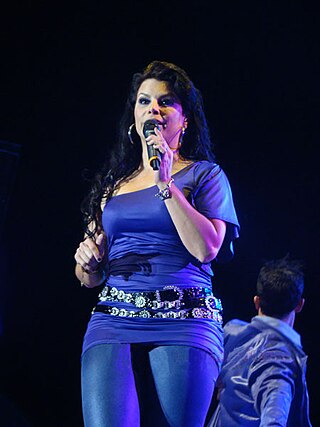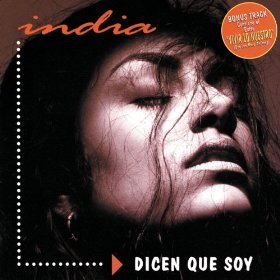
Merengue is a type of music and dance originating in the Dominican Republic, which has become a very popular genre throughout Latin America, and also in several major cities in the United States with Latino communities. Merengue was inscribed on November 30, 2016 in the representative list of the Intangible Cultural Heritage of Humanity of UNESCO.

Olga Teresa Tañón Ortiz is a Puerto Rican singer-songwriter. Over the course of her career, she has earned two Grammy Awards, three Latin Grammy Awards, and 29 Premio Lo Nuestro Awards.

Milagros del Rosario Quezada Borbón is a Dominican-American singer specializing in Merengue. She is a four-time Latin Grammy Award winner and has been referred to as the "Queen of Merengue" because of her impact on the world of merengue music.
Premio Lo Nuestro 2003 was the 15th anniversary of the awards. the show was hosted by Mexican presenters Marco Antonio Regil and Adal Ramones. Juanes, Thalía, Marc Anthony, Pilar Montenegro, Sin Bandera, Banda el Recodo and other Latin music greats gave electrifying performances. In the show, there was 36 awards winners with 135 nominations. In Pop genre, Awards was given for : Album of the Year, Best Male Artist, Best Female Artist, Best Group or duo, Best New Artist and Song of the Year. In Rock Genre : Best Rock Album and Best rock Performer of the Year. In Tropical genre : Best Tropical Album of the Year, Best Tropical Male Artist, Best Tropical Female Artist, Best Tropical Group or Duo of the Year, Best Tropical New Artist, Tropical Song of the Year, Best Merengue Performance, Best Salsa Performance and Best Traditional Performance. Juanes was the biggest winner of night, took home four awards Best Pop Male Artist, Best Music Video, Best Rock Performance, and Pop Song of the Year. In the Regional Mexican, Pilar Montenegro took three awards for Regional Mexican Song of the Year, Pop Song of the Year, and for Best Regional Mexican Female Artist. In the tropical genre, Celia Cruz took home with four great awards of the night for Best Salsa Performance, Best Tropical Female Artist, Best Tropical Song of the year and Tropical Album of the Year. At the night, the greatest performance was a medley of top Latin hits from the last 15 years, performed by the artists that made them famous, including Vikki Carr, Son by Four, Los Ilegales, La Mafia, Luis Enrique, Wilfrido Vargas and Olga Tañón. There was a great tribute to Celia Cruz by the world-famous salsa group "Fania All-Stars", of which Cruz was a member during the 1970s, reunited for an exclusive performance that rocked the house.

Puerto Rican singer and songwriter Olga Tañón has released fourteen studio albums, one EP album, three live albums and six greatest hits albums. She's known as "La Mujer de Fuego" for her electrifying stage performances and has received two Guinness World Records for being the tropical female artist with the most top 10 singles and the most awarded artist in the history of the Premio Lo Nuestro awards.

Luis Enrique Mejía López is an Nicaraguan-American singer-songwriter and composer. He is known as "El Príncipe de la Salsa". A grammy-award-winning artist, he has released over 20 albums and achieved widespread success, including his single "Yo No Sé Mañana" which was awarded a Latin Grammy Award for "Best Tropical Song".

Dicen Que Soy is the third studio album by Puerto Rican recording artist La India released on September 20, 1994, by RMM Records. The album was produced by American musician Sergio George, who chose the songs for India to record with an emphasis on feminism to suit with her voice. The production mixes salsa music with other rhythms such as funk and timba. Five singles were released from the record with "Nunca Voy a Olvidarte" and "Ese Hombre" topping the Billboard Tropical Songs chart.

"¡Basta Ya!" is a song by Puerto Rican singer Olga Tañón from her fourth studio album, Nuevos Senderos (1996). The song was written and produced by Marco Antonio Solís. It was released as the lead single from the album in 1996. "A ballad, the song is about unrequited love and marked a musical departure from Tañón's merengue recordings. The song was nominated for Pop Song of the Year at the 1997 Lo Nuestro Awards. Commercially, it topped both the Billboard Hot Latin Songs and Latin Pop Airplay charts in the United States. A music video for the song was filmed and features a couple's failing relationship.

Sobrevivir (Survive) is the eighth studio album by Puerto Rican recording artist Olga Tañón, released on 19 November 2002 by Warner Music Latina. The album was produced by Humberto Gatica, Kike Santander, and Manuel Tejada. Sobrevivir includes a collection of songs from different genres such as pop music, merengue, ballads, flamenco and tango. The album lead single, "Asi es La Vida", became Tañón's third number-one single in the Billboard Top Latin Songs and the seventh best-performing Latin single of the year in the United States.
The Lo Nuestro Awards or Premios Lo Nuestro is a Spanish-language awards show honoring the best of Latin music, presented by Univision, a Spanish-language television network based in the United States. The awards began in 1989.
The 9th Lo Nuestro Awards ceremony, presented by Univision honoring the best Latin music of 1996 and 1997 took place on May 8, 1997, at a live presentation held at the James L. Knight Center in Miami, Florida. The ceremony was broadcast in United States and Latin America by Univision.
The 14th Lo Nuestro Awards ceremony, presented by Univision and honoring the best Latin music of 2001 and 2002, took place on February 7, 2002, at a live presentation held at the James L. Knight Center in Miami, Florida. The ceremony was broadcast in the United States and Latin America by Univision.
The Lo Nuestro Award for Tropical/Salsa New Artist of the Year is an honor presented annually by American network Univision. It was first awarded in 1989 and has been given annually since to recognize the most talented performers of Latin music. The nominees and winners were originally selected by a voting poll conducted among program directors of Spanish-language radio stations in the United States and also based on chart performance on Billboard Latin music charts, with the results being tabulated and certified by the accounting firm Deloitte. At the present time, the winners are selected by the audience through an online survey. The trophy awarded is shaped in the form of a treble clef.
The Lo Nuestro Award for Best Merengue Performance is an honor presented annually by American network Univision. The Lo Nuestro Awards were first awarded in 1989 and has been given annually since to recognize the most talented performers of Latin music. The nominees and winners were originally selected by a voting poll conducted among program directors of Spanish-language radio stations in the United States and also based on chart performance on Billboard Latin music charts, with the results being tabulated and certified by the accounting firm Deloitte. At the present time, the winners are selected by the audience through an online survey. The trophy awarded is shaped in the form of a treble clef.
The Lo Nuestro Award for Tropical Song of the Year is an honor presented annually by American network Univision. The Lo Nuestro Awards were first awarded in 1989 and has been given annually since to recognize the most talented performers of Latin music. The nominees and winners were originally selected by a voting poll conducted among program directors of Spanish-language radio stations in the United States and also based on chart performance on Billboard Latin music charts, with the results being tabulated and certified by the accounting firm Deloitte. As of 2004, the winners are selected through an online survey. The trophy awarded is shaped in the form of a treble clef.
The 25th Lo Nuestro Awards ceremony, presented by the American network Univision, honored the best Latin music of 2012 in the United States and took place on February 21, 2013, at the American Airlines Arena in Miami, Florida beginning at 5:00 p.m. PST / 8:00 p.m. EST. During the ceremony, Lo Nuestro Awards were presented in 33 categories. The ceremony, televised in the United States by Univision, was produced by Antonio Guzmán. Mexican performers Ninel Conde and Pedro Fernández hosted the show.
The Lo Nuestro Award for Tropical Album of the Year is an honor presented annually by American television network Univision at the Lo Nuestro Awards. The accolade was established to recognize the most talented performers of Latin music. The nominees and winners were originally selected by a voting poll conducted among program directors of Spanish-language radio stations in the United States and also based on chart performance on Billboard Latin music charts, with the results being tabulated and certified by the accounting firm Deloitte. However, since 2004, the winners are selected through an online survey. The trophy awarded is shaped in the form of a treble clef.
The 26th Lo Nuestro Awards were presented by the American network Univision, honoring the best Latin music of 2013 in the United States. The ceremony took place on February 20, 2014, at the American Airlines Arena in Miami, Florida beginning at 5:00 p.m. PST. The Lo Nuestro Awards were presented in 33 categories and it was televised by Univision. Mexican singer Ninel Conde and Cuban American actor William Levy hosted the show.
The 7th Lo Nuestro Awards ceremony, presented by the Univision, honored the best Latin music of 1994 and 1995 and took place on May 18, 1995, at a live presentation held in Miami, Florida. The ceremony was broadcast in the United States and Latin America by Univision.

Nuevos Senderos is the fourth studio album released by Puerto Rican singer Olga Tañón on April 16, 1996. The album marks a musical departure from her merengue recordings and instead focuses on pop ballads. The songs were composed and produced by Mexican singer-songwriter Marco Antonio Solís, except for "Cuestión de Suerte", which was written by Jesus Monarrez. It was nominated at the 9th Lo Nuestro Awards in 1997 for "Pop Album of the Year".







